At a pivotal moment in American political discourse, Vice President Kamala Harris delivered a powerful speech in Washington, D.C., framing the upcoming election as a critical choice between democracy and authoritarianism. Standing at the same park where former President Donald Trump incited the mob that attacked the U.S. Capitol on January 6, 2021, Harris asserted that the stakes of the election extend beyond mere political competition; they represent a fight for the futures of everyday Americans. She argued that Trump’s obsession with personal grievances and retaliation can not only derail the nation’s progress but can also undermine the fundamental rights and freedoms that Americans hold dear. Harris’s speech served as a strategic opening to mobilize support ahead of Election Day, emphasizing her dedication to ensuring better lives for citizens through tangible policy initiatives rather than divisive rhetoric.
In her remarks, Harris made a stark contrast between her proposed approach to governance and Trump’s hypothetical agenda. She claimed Trump would enter the Oval Office with a personal “enemies list,” whereas she would focus on a “to-do list” aimed at benefitting the American people. Highlighting her own upbringing, she illustrated the struggles of many families, referencing her single mother’s perseverance and financial challenges. She criticized Trump’s tax proposals, claiming they favored billionaires at the expense of the average American family, who would suffer under a proposed national sales tax. Harris reiterated her commitment to honoring the dignity of work and ensuring that working-class families can thrive, promising tax cuts for the middle class and crucial investments in housing, healthcare, and child care.
Harris tailored the setting of her speech to evoke feelings of patriotism and leadership. By speaking at the foot of the White House, flanked by signs reading “FREEDOM,” she reinforced her narrative that she embodies the true spirit of American democracy, juxtaposing it against what she described as Trump’s authoritarian impulse. Drawing historical parallels, Harris positioned herself as a guardian of liberty, insisting that the sacrifices made for freedom throughout American history must not be in vain. She echoed a recurring theme of her campaign: that the nation was founded on the struggle against tyranny, and it is imperative that those freedoms continue to be upheld against any forces that seek to curtail them.
Throughout the speech, the vice president also fostered an image of bipartisanship, clearly communicating her willingness to engage with Republicans and independents. She emphasized the need for common ground and pragmatic solutions to aid those in need, thus attempting to dismantle the image of division that often accompanies modern political campaigns. Harris expressed a pledge to pursue inclusive policymaking, a strategy that could potentially resonate with moderate voters and underscores her focus on working collaboratively across the aisle. This appeal to unity aimed to position her as a pragmatic and approachable leader, in contrast to Trump’s more confrontational and divisive style of governance.
However, her remarks did not entirely escape criticism from the Trump campaign, which reiterated past grievances. Trump’s team accused her of failing to deliver substantial solutions during her time in office, framing her election pitch as an attempt to distract from the current administration’s responsibility for various national challenges. This narrative persisted despite the backdrop of her impactful rhetoric and detailed policy agenda, reflecting the contentious political climate. Even as Trump held a rally simultaneously in Pennsylvania, observers highlighted the contrasting electoral strategies, with Harris leaning towards an inclusive and proactive stance, while Trump focused on grievance and confrontation in an attempt to secure his base.
The broader sentiment shared among Harris’s supporters echoed the urgency and stakes of the election. Many attendees expressed profound concern over the possibility of a Trump presidency eroding civil rights and freedoms. Personal testimonies underscored fears of retribution and chaos returning to the nation’s political landscape should Trump regain power. Harris’s message resonated deeply, as voters articulated the hopeful prospects of her presidency as a means to reclaim and protect democratic values. Not only did the rally represent an affirmation of support for Harris’s candidacy, but it also served as a clarion call for voters to recognize the necessity of their participation in shaping the country’s future narrative against the potential rise of authoritarianism.

